- The trend topics: servo drives, digitalisation, networking, condition monitoring
- ROEMHELD presents industry 4.0-compatible die clamping technology
Hilchenbach, January 13, 2020. Manufacturers of forming presses and stamping presses feel well prepared for the production of components for electromobility. The corresponding machines are consistently on offer. This was confirmed by a survey conducted by the clamping technology specialist ROEMELD at Blechexpo with its industrial partners AIDA, Andritz Kaiser, Bruderer, Schuler and Simpac.
The experts believe that in the near future there will be a trend towards simple, cost-effective and easily retrofittable solutions for digitalisation and networking of presses as well as for condition monitoring. The aim is to make it possible to experience the benefits of the technologies and, in particular, to convince small and medium-sized enterprises. According to the experts, servo presses are likely to gain further market share in the coming years, not at least due to increasingly complex processes. Growth opportunities are seen above all in Asia and the NAFTA countries.
In the future, the tasks of die clamping technology could go beyond the mere optimisation and automation of set-up times. Thus, industry 4.0-compatible clamping elements are assigned an important role to be able to control additional functions in the die as processes become more complex and to supply condition monitoring with data.
Presses for electromobility require particularly large die installation space
“The effects of electromobility are more likely to affect customers who manufacture engine technology or powertrain components, and we are less affected by the effects in the area of press technology design,” explains Moritz Bernd, managing director of Simpac Europe GmbH. With the combustion engine, exhaust and drive components are eliminated. But “electric cars also need body and structural parts, metal housings for batteries or electrical sheets for engines, as they are produced on our presses,” emphasizes Simon Scherrenbacher, deputy press spokesman of Schuler AG. Wolfgang Wiedenmann, deputy sales manager of Andritz Kaiser, sees the situation similarly: “All in all, losses and profits balance each other out.”
Complex progressive dies with many stations are often used to produce powerful and highly efficient electric motor packages from particularly thin electrical sheets. For this purpose, machines with a particularly large installation space are required in which the longer dies can be clamped. All manufacturers offer corresponding presses, some as variants of existing series.
The digital future of the forming press: with servo drive, networked, proactively maintained
For the coming years, Simpac managing director Moritz Bernd prognosticates: “Dies continue to increase in complexity as more operations are integrated. Therefore, servo presses remain the preferred system, which will gain market share worldwide.” At the same time, the topics Industry 4.0, Condition Monitoring and Preventive Maintenance will be further promoted in the future.
Gottfried Ebneter of the Swiss manufacturer Bruderer sees a similar development: “Over the next few years, servo technology will also continue to prevail in punching machines. Customers expect the machine supplier to be competent in the areas of digitalisation and Industry 4.0, as they still have little know-how in this field.” However, he limits that many questions have not yet been conclusively clarified: “Although we often already collect data, we often do not know exactly who owns this data and how we can use them sensibly. There is also a lack of business models that satisfactorily define the costs and performance of Industry 4.0 applications. And the issue of cyber security has not yet been satisfactorily resolved either.”
That the sensible use of data will come, is undisputed. “In the future, we see digitalisation as an important topic”, is also emphasized by the Italian press manufacturer AIDA Europe. But Michele Archenti, sales and marketing manager, and Stephane Muesser, sales product manager concede: “Today, we are at the beginning, and we are only slowly learning how to use data efficiently.”
New industry 4.0 clamping element from ROEMHELD collects data directly on the press ram
Like the manufacturers, the clamping technology specialist ROEMHELD is also preparing for the digitalisation of the presses. At Blechexpo, he presented for the first time a new series of the rapid-clamping system Flexline, which is suitable for predictive maintenance and use in Industry 4.0 applications.
The element not only clamps dies fully automatically, but also uses integrated sensors to measure clamping forces on the press ram in real time and forwards the data to the machine control. Therefore, the operator always knows the real clamping force on the die; he can immediately detect an overload on the clamping element and thus on the die, the occurrence of unusual stripping forces, die breakages and signs of wear. Also, the clamping force curve is recorded, which simplifies error analysis and enables rapid problem solving when servicing.
Since the rapid clamping system has a modular design, it can be configured in many ways and used on almost all press models and for every die. Apart from the initial installation, it is also suitable for retrofitting. It can also be used in the automation of press lines.
ROEMHELD: Set-up time optimiser for sheet metal forming, plastic and rubber processing
With its extensive portfolio of die clamping technology, the set-up time optimiser ROEMHELD solves almost every clamping task in sheet metal forming, plastics and rubber processing. The magnetic, hydraulic and electro-mechanical clamping systems are highly versatile and contribute to making processes in single and series production of nearly all industries more efficient and economical. Products for die change such as die changing cart, roller bars and driven carrying consoles complete the product range.
About ROEMHELD:
Whether for aircraft, automobiles, machine tools or cases for smartphones: technologies and products of the ROEMHELD Group have been used to manufacture numerous industrial commodities and goods for end users for more than 60 years.
Efficient clamping technology solutions for workpieces, as well as for dies in forming technology and plastics processing, form the core of our ever-increasing portfolio. This is supplemented with components and systems for assembly and handling technology, drive technology and automation as well as locking mechanisms for rotors on wind energy systems.
In addition to a constantly growing range of more than 30,000 catalogue items, the ROEMHELD Group also specialises in the development and realisation of customised solutions and is internationally regarded as one of the market and quality leaders.
Innovation through tradition: ROEMHELD was established in 1707 with a foundry in Friedrichshütte, which still belongs to the ROEMHELD Group today and counts as one of the oldest active industrial businesses in Germany.
The owner-managed group of companies employs approximately 560 workers in its three locations of Laubach, Hilchenbach and Rankweil/Austria, and is represented in over 50 countries by service and sales organisations. With customers from the mechanical engineering sector, as well as the automobile, aviation and agricultural industries, the ROEMHELD Group generates an annual turnover of more than 110 million Euro.
- Bernd Moritz, CTO and Vice President SIMPAC Inc. and Managing Director of SIMPAC Europe
- Michele Archenti, Sales and Marketing Manager (right), and Stephane Muesser, Sales Product Manager AIDA.
- Gottfried Ebneter, Head of Application Technology, BRUDERER
- Simon Scherrenbacher, Deputy Press Spokesman of Schuler AG with a rotor and stator laminated core for an electric motor.
- Wolfang Wiedenmann, Deputy Sales Manager, ANDRITZ Kaiser GmbH
- The new series of the rapid-clamping system Flexline is suitable for condition monitoring and use in Industry 4.0 applications


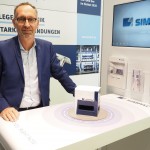

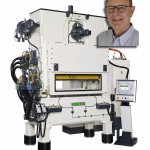
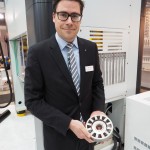
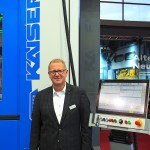
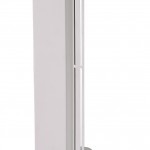
Leave A Comment
You must be logged in to post a comment.